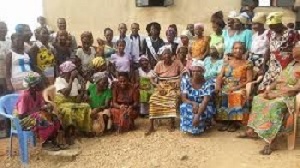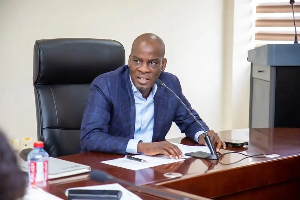At Pulbaa, a small community in the Daffiama-Bussie-Issa District of the Upper West Region, scores of widows have been held hostage by an outmoded cultural practice – destroying their lives and the future of their children.
They have kept waiting for more than six years to undergo spiritual cleansing after they had lost their husbands to lead normal life.
The interminable wait for the performance of the esoteric rituals is increasingly making many of them anxious and tensed up.
“I did not just lose my husband to death but also my dignity as a result of a result of the cultural practice”, 40-year Alamusa Selinaa said emotionally, as tears rolled down her wrinkled yet beautiful face.
She was thrown into widowhood after her husband died six years ago. This marked the beginning of her troubles - her suffering in silence.
“Since the sudden death of my husband, leaving a normal life has become impossible, as I have been struggling with a raft of dehumanizing taboos.”
Alamusa manages a small farm to take care of herself and four young children. The education of these children is threatened. Produce from her small farm is not enough to sustain them through the season.
Kuntaabiema Ba-uro, 56, also lost her husband six years ago and has since assumed full responsibility of fending for her six children, one of them, physically-challenged.
“I have been suffering from chest pains and anytime I overwork myself, I am unable to sleep, I endure excruciating pain throughout the night.”
She adds that her self-esteem has been completely crushed.
Thirty-six (36) year Pascalina Nyununu’s spouse passed on about five months ago. The young widow is finding things tough to take care of the one child she has with the deceased as a result of the archaic cultural practice.
Pascaline quickly rose to her feet as I approached her for an interview and as a stranger in the community I took that gesture as a sign of respect.
But, no, that was not the case. She was simply avoiding the potential danger of breaking the many taboos un-cleansed widows in the community are forced to observe.
“I rose to my feet as you approached me because if you cross my legs, you will be required to pay money to me or else I face the consequences”, she said.
Many widows are suffering cultural enslavement in the Pulbaa community. Why, the death of somebody’s husband should condemn them to live the life of a prisoner at this time and age remains a puzzle.
Their only crime is that they have not received spiritual cleansing and therefore should be socially-excluded, become emotionally-distressed and economically-crippled.
These widows are burdened with the load of single parenting, a situation that has plunged them into extreme poverty and denying their children formal education.
Alamusa and her colleagues have no opportunity to re-marry because of the failure of traditional authorities in the community to perform the spiritual cleansing.
Old and tired-looking Susana Kunnaye, one of the widows, said her children all dropped out of school and travelled down south in search of menial jobs since she was unable, not only to feed them, but also pay for their education.
Pulbaa community members strongly believe in the powers of the dead. This belief has led to the cultural practice of performing spiritual cleansing of women whose husbands pass away.
It is usually done to clear a widow of any spiritual connections with the late husband and to pave way for her to re-marry or become sexually involved with another man.
The “Tindaana” (landlords) solely hold the power to perform the spiritual cleansing. The process was, however, truncated six years ago, resulting in the current predicament of the victims.
Even though community members are tight-lipped on what caused the truncation of the spiritual cleansing for fear of victimization, investigations revealed that it was due to the theft of symbol of authority of landlord after he passed on six years ago. The said theft happened during his burial.
His funeral rites cannot be performed without the symbol of authority. This has not yet been found and it may never be found.
The children of the Tindaana are unwilling to perform the spiritual cleansing for the poor women until the symbol of authority has been found and their father’s funeral rites performed.
“My life has become a misery after my husband died and I fear it will remain like that till I die since the symbol of authority may not be found” Kunnaye lamented.
The widows, sadly, are battling with several taboos, making life uncomfortable for them - denied the joy of remarrying or living a normal life with another man.
Sexual intercourse with any man, consensual or accidental (rape), will lead to excommunication from the community.
Public gatherings, such as markets and funerals, are risky places for them to go, as it is a taboo for a widow to stretch out a hand for greetings. The widows must not allow anyone to walk over their stretched legs.
These widows can neither make their hair nor have their natural hair combed even after bathing. When a victim’s head is bushy, it only takes another victim to shave her.
The shaved hair must be kept safely in any type of container and must not get missing. Widows are also barred from wearing ear rings and other jewellery.
Eating guinea fowl meat, a delicacy in the village, is forbidden for the un-cleansed widows. It is widely believed that an un-cleansed widow who eats the forbidden meat will suffer from bloated stomach till she dies.
A rope is usually tied around the waist of a widow and she dares not remove it as there are grievous consequences for doing so. Dozens of women are currently trapped under such outmoded cultural practice in the community.
For these widows, one thing is clear; their lives are in total mess. This was evident in the tears that rolled down the beautiful face of Alamusa as she narrated her ordeal.
Her tears summed up the magnitude of the burden and suffering the traditional practice has inflicted on her and many of her colleagues.
These women would not have remained widows today if they had their spiritual cleansing earlier. Now marriage has eluded them.
Naa Felix Moteni, Chief of Pulbaa, said it was his wish to see the negative cultural practice tackled to liberate the unfortunate widows.
He explains that the community is made up of Christians, Moslems and Traditional believers, and that the practice is only binding on the traditional believers.
Naa Moteni, who is a Christian, said as the chief of the village, he made several unsuccessful attempts to find a solution.
“I am worried myself and looking for help because the power to resolve the issue does not lie with me but the landlord of the community”, he said.
“I am even ashamed that you have heard of this practice and you have come to talk to me about it”, he confessed to this reporter.
Investigations revealed that some neighbouring communities are avoiding marrying their daughters to men from Pulbaa because of the retrogressive cultural practice.
They would not want their daughters become victim to such dehumanizing practice.
Mr. Nadi Imoro Sanda, District Chief Executive (DCE) for Daffiama-Bussie-Issa, described as shocking the practice and said the social cost of what the widows were passing through could not be quantified.
He admits urgent steps needs to be taken to liberate women of the community from the cultural bondage.
Madam Charity Batuure, Acting Upper West Regional Director of the Department of Gender, added that “a cultural practice of this kind is simply dehumanizing and an infringement on the fundamental human rights of women”.
“Socially, these widows are cut off from participating in any form of economic activity which further enhances their insecurity to livelihood sustainability.”
Culture, is dynamic and gives room for improvement to suit human existence.
Madam Batuure said when women are cut off from economic activities it has dire consequences on the family and society at large considering the critical role women play from home building to community development.
She, therefore, called for traditional and religious leaders, as well as landlords, to do an assessment of their cultural practices and belief systems and to carry out reforms.
The attainment of Sustainable Development Goal Five (SDG 5) which advocates the removal of all harmful traditional practices against women and girls in the private and public spheres will be a mirage if cultural practices such as this still exist in full force.
Goal Four which talks about quality education is under threat as children of these widows are not assured of any meaningful education.
The widows of Pubaa and their children must be rescued now in the quest to achieving these SDGs otherwise they will remain a scar on the conscience of the world.
Regional News of Friday, 14 September 2018
Source: ghananewsagency.org
Cultural enslavement: Widows in Pulbaa suffer in silence
Entertainment












